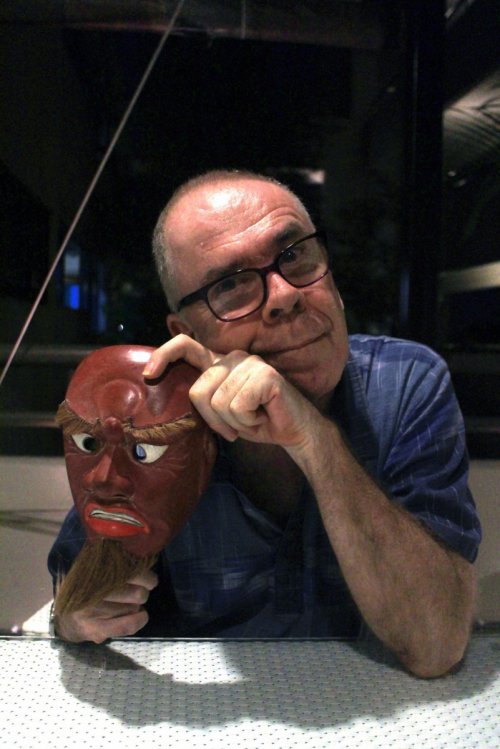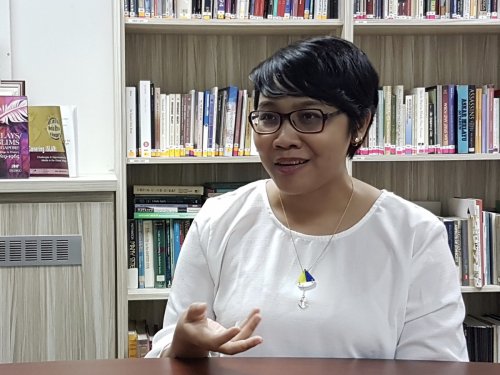By Judith Toh Qing Mei
Diploma in Creative Writing for TV and New Media
Singapore Polytechnic

Roger Jenkins’ love for storytelling started 20 years ago. Today, he tells stories in schools and even workplaces around Singapore and Southeast Asia. (Photo credit: Judith Toh)
Considered to be one of the best storytellers in Singapore today, Roger Jenkins, 65, entertains with his natural ability to change his expressions and voices in the blink of an eye to tell his tales. Yet, he is actually an “accidental storyteller”.
Finding his Calling
Twenty years ago, Roger was an accomplished businessman and writer. He started a theatre group for the hearing impaired and had even won the Singapore Literature Prize in 1995 for his collection of poems: From the Belly of the Carp: Singapore River Voices.
In 1998, his career took a slight turn when he began to teach English at the Ministry of Education through storytelling. He realised that telling stories, and not writing, was his calling.
“It was that wonderful moment when I told the story… it’s really a powerful thing,” he said.
Even though he is a veteran in the industry now, he still finds immense joy from seeing the smiles on people’s faces when they hear his stories. He especially enjoys experimenting with quirky methods such as magic and sign language to convey his messages.
“One of the key features of oral storytelling is that it’s interactive nature, where you are looking for ways to get the audience to respond either vocally, or physically,” he explains.
Although it is an art form usually associated with children, Roger even uses his gift to tell stories to grown-ups in workplaces. He firmly believes in the power of storytelling in both society and the workforce. He has conducted workshops to managers on how to use storytelling to connect with their employees.
A New Platform
Born in Singapore to British parents, Roger describes himself as “a big fish in a very tiny pond” that is the Singapore storytelling scene. But he’s not resting on his laurels. With technology taking over the world, he has to adapt his craft.
He has a YouTube channel, rogerstoryteller. Some may think that telling stories to an audience of one – the video camera – is much easier compared to an actual public performance. However, Roger begs to differ. In front of the camera, he must be more expressive than usual while keeping his hand actions and props within a tight space.
The channel has given him the opportunity to reach out to people from all around the world, with his most popular video receiving over 20,000 views. Though his main motive for going digital was to expand his audience, Roger also recognises that this platform is a means to leave his mark on the storytelling scene. It’s also a vehicle to promote storytelling as a powerful tool that many do not know about.
“People come to listen to a story with different points of access and that’s why stories really speak to people.”
By Simran Devdas Sawlani
Diploma in Creative Writing for TV and New Media
Singapore Polytechnic
Peh Shing Huei is an award-winning and bestselling author but he has a major problem on his hands as far as his local audience is concerned.
“We do read, but we don’t read enough. Period. Regardless of authors,” he states.
It’s not something he can relate to. He has been an avid reader of nonfiction since he was young, devouring books about wars, pop culture, sports and so on.
But in this generation of rapid technological growth, 43-year-old Shing Huei says that reading has taken a backseat as most people use their smartphones to play games, text, and engage with social media instead, especially when travelling on public transport.
Added to that, local authors find they have to fight with internationally renowned names to get their work displayed in bookstores.
“Writing a book is anything but romantic; it’s incredibly hard,” he says.
However, Shing Huei’s love for facts and writing about them outweigh these challenges. He combined these passions in his career as a journalist.
And it was his five-year stint as China Bureau Chief for the Straits Times that sowed the seeds of inspiration of his first book, When the Party Ends. The book, which documents the rise of China and the challenges it faces, was the co-winner of the 2016 Singapore Literature Prize.
Writing the book was no easy feat.
“Obtaining information from the government of China as a foreign journalist is like trying to pull teeth from a lion – it’s near impossible,” he recalls.
His last book was Neither Civil nor Servant, the biography of Philip Yeo, Singapore’s former Economic Development Board chairman. Shing Huei says he is currently working on a new book. He writes in the hope of letting people gain insights into what they do not know; just as he loved gaining knowledge from the books he read when he was young.
By Danica Kelly James
Diploma in Creative Writing for Television and New Media
Singapore Polytechnic
As a child, she was destructive, picking fights at the playground and breaking other kids’ toys. Who would have thought that she would find a way to turn her violent tendencies into creative stories?
Nuraliah Norasid, 31, has used writing as an outlet since her childhood. Her passion for writing grew and led to her winning the Epigram Books Fiction Prize in 2016 for her manuscript The Gatekeeper. The published novel was shortlisted for the 2018 Singapore Literature Prize.

Nuraliah Norasid has been writing her own stories since she was in kindergarten. (Photo Credit: Danica Kelly James)
Where it all began
Nuraliah grew up in a poor home and was raised in a family with many financial difficulties.
She recalls being a very angry child, having come from a violent home environment.
“I was not allowed to laugh, cry or show any kind of emotion at home – that would get me into trouble.”
As a result, she lashed out at the kids in her neighbourhood, until she discovered writing, which gave her a sense of peace no other activity could.
“As a kid I had a tendency to take all of these fairy tales I wasn’t too happy with and then rewrite them in my own way,” she says.
Even now, years later, she still does that. She takes stories she is unsatisfied with and turns them into something entirely new that she feels good about.
Writing, for Nuraliah, is a way to escape from the stress of reality into a realm of imagination, where heroes and complex characters exist as she imagines them.
In this world of her imagination, “magical things could happen; more improbable things can take place.”
Some ideas do not take any shape, but others demand to be written.
“It’s almost a compulsion to write these things,” she says of putting her words onto paper.
Her debut novel
The idea for her debut novel took shape while she was doing her PhD.
The Gatekeeper is a fantasy novel. It includes an unusual interpretation of the mythical character, Medusa.
The early manuscripts of The Gatekeeper were very different from the published novel. Originally, there were no elements that differentiated it from a typical Western fantasy novel. Nuraliah put them aside and made changes to the characters and storyline to bring in a more local perspective.
She makes use of local language, common sights and socio-political background to keep her writing authentic to Singapore.
“I think that Medusa herself in the novel is actually very Malay,” she says of the character in the novel. “I recognise her in any Malay girl.”
She was hesitant about submitting the manuscript for the Epigram Books Fiction Prize, but did so at the insistence of her fiancé.
She attended the awards ceremony, expecting to leave empty-handed, but was shocked and mortified when she walked away with the prize she had expected to lose to the more experienced authors in the room.
“Someone said I looked like Halle Berry when she got her Oscars,” she laughingly remembers, referring to the actress’ emotional acceptance speech in 2002.
As the winner, her manuscript was published in 2017 as her debut novel.
Nuraliah is quick to give her fiancé credit for pushing her to submit the manuscript.
“If I had not submitted, I don’t think I would have published anything. I would forever have written books, and then hidden them in the drawer with all of my embarrassing juvenilia.”

